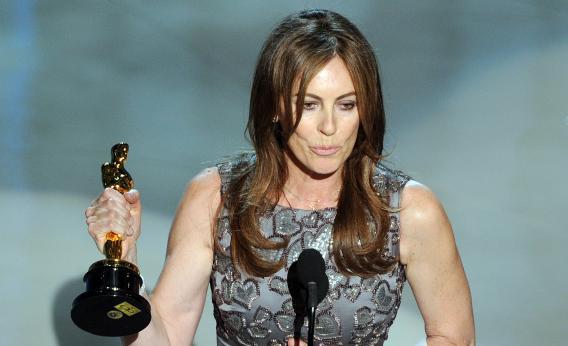Every 10 years since 1952, the British film magazine Sight & Sound polls a large pool of critics on what they believe are the greatest films of all time. The magazine touts the pure rankings—this year, Alfred Hitchcock’s Vertigo ousted Orson Welles’ Citizen Kane for the first time in 50 years—but the poll is also meant to track subtle changes in critical consensus. And one thing that hasn’t changed? Women directors remain on the margins. As Forrest Wickman pointed out, no film directed by a woman landed in the reshuffled top 10, and only one film directed by a woman landed in the list of 50: 1975’s Jeanne Dielman, 23 quai du Commerce, 1080 Bruxelles by Belgian director Chantal Akerman.
So why are there so few women on the list? The best explanation is probably that during the time period that the list suggests the critics favor, the number of women directing feature films was tiny. A Directors Guild of America analysis of Hollywood features made between 1939 and 1979 found that out of the 7,332 movies released, only 14 were directed by women. Even in an industry that employs women and people of color at jaw-droppingly low rates (in the 2010-11 television season, for example, women of color directed just 1 percent of television episodes), that figure is staggering. So if the critics polled believe that the greatest direction in movie history was happening during those years, which is seems that they do, they have very few films by women to chose from.
It doesn’t help that some important women who worked during that period went uncredited. British actress, writer, and producer Ida Lupino directed everything from episodes of Gilligan’s Island to Outrage (one of the first movies of the production code era to address sexual assault) to The Hitch-Hiker, the first noir film directed by a woman. Still, she was not given credit for directing the 1949 film Not Wanted, about a woman who gives up her child for adoption, which she wrote and then took over for the movie’s original director after he suffered a heart attack.
One of the most important female directors of the last century also essentially disqualified herself from consideration for greatness. Leni Riefenstahl is an undeniable technical innovator, and Triumph of the Will is no less visually impressive for the repugnance of its ideas. But Riefenstahl’s affiliation with the Nazi regime prevented her from working after her arrest and release at the end of the war, and tainted her work forever.
What about now? There are some women making extraordinary films that critics of the future (because critics tend to be nostalgic in their list-making) may remember as great. Kathryn Bigelow finally broke one Oscar glass ceiling by becoming the first woman to win a directing Oscar in 2010 for her Iraq war movie The Hurt Locker. French director Catherine Breillat’s provocative films about gender, sex, and violence (from Fat Girl to Sex is Comedy to Bluebeard) are critically beloved and may enter the canon.
But many women directors are working in genres that are simply never given the same critical respect as male-dominated genres. Films about romance, relationships, and sexuality are often considered decidedly second-tier, particularly romantic comedies. Nora Ephron’s best movies may live in the hearts of audiences forever, but I’d be surprised to see the Sight & Sound critics give her space on their ballots.
As frustrating as the poll results are, they are also an opportunity to call attention to the dearth of women behind the camera, and not simply to shake up the composition of best lists. More women directors means different takes on action movies, on big commercial schlock, and yes on family, sex, and love too. The Sight & Sound critics can debate the past endlessly, but I’m excited for the future, and the women who will break in to expand what we see at the movies.
Clarification, August 3, 2012: This piece originally stated that Ida Lupino directed On Dangerous Ground. While she filled in when director Nicholas Ray fell ill, she did not direct most of the film. That line has since been removed.
